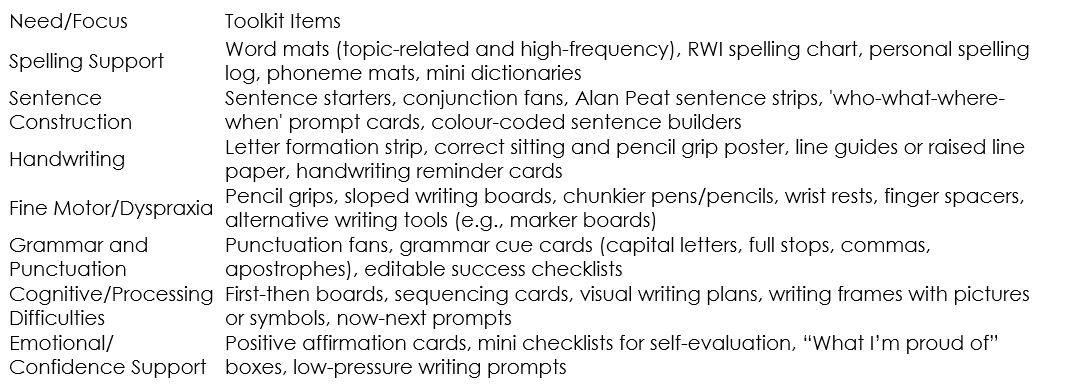Writing
Living our Faith, Learning in Love
Overview
At All Saints’ Catholic Primary School, we are passionate about developing articulate, imaginative, and skilled communicators. Our ultimate aim is that by the time our children leave us, they are able to communicate confidently and creatively about the world around them. They are inspired by real authors, understand the importance of audience and purpose, and are equipped with the tools to write effectively across a range of contexts.
Curriculum Intent
Our Writing Curriculum ensures that children leave us with a secure understanding of the full writing process: planning, drafting, editing, and publishing. Children learn to see writing as a craft, refining their ideas and structures with clarity and purpose. Spelling, punctuation, and grammar are explicitly taught and embedded through imaginative, stimulating activities and are consistently applied in their independent writing.
Children at All Saints’ leave us passionate about expressing themselves clearly and meaningfully. They understand that grammatical devices are not rules for the sake of rules, but powerful tools that allow them to communicate precisely what they mean. Through real-life experiences and authentic writing opportunities, our pupils recognise the value of their words and the impact they can have on others. Ultimately, we aim for every child to know that their writing can be used to make the world a better place.
At All Saints’, from Nursery upwards, pupils are immersed in a rich range of writing opportunities. From their earliest mark-making to crafting sophisticated pieces in Year 6, children are guided through a structured writing process: generating ideas, planning, composing, drafting, editing, and publishing.
Our bespoke All Saints’ Writing Process supports this journey. Each Writing Unit begins with an engaging ‘hook’ to inspire creativity and enthusiasm. Children explore and extend their ideas through thought-showering activities before closely studying model texts to understand key features of the genre. They then innovate, plan and compose their own writing, embedding daily grammar and vocabulary skills in context. Through regular opportunities to draft, edit, and redraft their work, children are supported to improve and refine their writing with increasing independence.
Throughout the curriculum, writing is embedded in a broad range of experiences and curriculum subjects. Children write for a variety of real audiences and purposes, ensuring they see themselves as genuine writers with something important to say.
Curriculum Implementation
A Research-Informed, Child-Centred Approach to Writing
At All Saints, our writing curriculum is firmly rooted in both evidence from the DfE Writing Framework and our Catholic school values, ensuring that children are supported to become confident, independent writers through a structured, sequenced, and purposeful approach.

Key Principles of Our All Saints’ Writing Curriculum
- Compliance with National Curriculum:
- Our writing tasks are selected based on ensuring our children write for a wide range of purposes and audiences, ensuring that the breadth of the National Curriculum Programme of Study for English is covered.

2. Writing Is Complex – We Teach It Sequentially
- Writing is cognitively demanding, placing pressure on working memory. RAFT helps students understand their reason to write, the audience they will address, the features of their writing, and the topic they’ll be writing about.
- We follow a step-by-step writing process: planning, sentence crafting, drafting, editing, and publishing to reduce overload and develop confidence.
- Teacher modelling is essential – physical modelling of handwriting, sentence construction, and editing by teachers happens daily.
3. The Reception Year Is Foundational
- Children begin writing in Nursery and Reception, supported by high-quality transcription teaching (handwriting and spelling) using Letter Join and RWI Phonics.
- Oral composition and sentence instruction begin early, laying the groundwork for success in later years.
4. Prioritise Transcription Skills
- Spelling is taught daily using RWI Spelling (Y2–Y6)
- Handwriting is taught explicitly 2x weekly, using Letter Join, with interventions provided for pupils needing additional support.
- Pencil use continues until joins are consistently accurate; pens are used from Year 4 once all letters and joins are secure.
5. Sentence Instruction Is Core
- The July 2025 Writing Framework states that sentence-level instruction must be explicitly taught, modelled and practised in context. It should be embedded within the wider writing process and carefully planned to improve composition and help children write with greater control, precision and intent. We support this by offering sentence-level instruction that is completed daily and is at the heart of a writing curriculum acting as ‘the engine that propels pupils from writing way they speak to using the structures of written language’.
- There is a whole school understanding that, for most pupils, composition begins orally, and that talk remains valuable throughout the writing process.
- Teaching sentences is recognised as central to teaching composition. Pupils learn to write well by mastering sentences first.
- Sentence structure work forms part of writing lessons.
- Teachers support pupils to apply grammatical knowledge in sentence construction.
- Vocabulary is built through robust, explicit and purposeful instruction.
6. Quality Over Quantity
- Pupils are expected to write for purpose, with quality modelled and celebrated.
- Writing units focus on deepening understanding and sentence construction rather than early extended pieces.
- Each unit ends with a published final piece.
- Develop Independent Writers
- Pupils Y2–Y6 have independent jotters to encourage self-directed writing, especially valuable for Greater Depth learners.
- Writing Toolkits and Success Checks support independent application of writing features across the curriculum.
8. Embed Writing Across the Curriculum
- Writing opportunities are woven into the wider curriculum, especially RE, ensuring purposeful and authentic writing experiences.
- At least one extended piece is produced weekly in a foundation subject. This is often developed from a Writing for Pleasure lesson each week.
9. Assessment Is Ongoing and Holistic
- Judgements are based on multiple independent pieces across a unit, not isolated cold writes.
- Work is evidenced in yellow English Skills Books.
- Whole Class marking—with clear targeted feedback evidenced on the whole class feedback sheets
10. Writing for Pleasure Opportunities.
- Children benefit from weekly opportunities to Write for Pleasure across our curriculum.
Handwriting & Word Processing:
-
- Handwriting is taught in timetabled sessions in KS1 and Year 3, and ad hoc in years 4-6, using the Letterjoin scheme. Our children do not write with pens until Year 4.
- In Reception, our children build the gross and fine motor skills they need for fluency in writing, including the teaching of correct (tripod) pencil grip and posture for writing. Correct letter formation is taught using the Read Write Inc handwriting phrases and visuals during our daily phonics sessions, to ensure each letter has the correct orientation. Our expectation by the end of EYFS is that all children can write (print) recognisable letters, most of which are correctly formed, and that they can scribe simple phrases and sentences which are readable by others. In Year 1, we continue to develop their fine and gross motor skills before making the transition to pre-cursive writing in teacher-modelled handwriting sessions. In Year 2, we begin to teach the joining of letters and embed the concepts of relativity of letter sizing and orientation. This work continues in Year 3, and beyond if required. By Year 6, most of our children meet the KS2 standard for handwriting, which is that they can 'maintain legibility in joined handwriting when writing at speed'.
How we teach SPaG (Spelling, Punctuation and Grammar) at KS1 & KS2
Informed by the Education Endowment Foundation (EEF) guidance on literacy development and best practice in primary writing.
1. We teach SPaG explicitly and systematically
We know from research that systematic, explicit instruction in grammar, punctuation and spelling leads to better writing outcomes when embedded in meaningful contexts.
- Teachers plan discrete SPaG sessions (at least 2 per week), following a progressive long-term plan.
2. We link Grammar and Punctuation to Real Writing Tasks
We know from research that grammar is most effective when linked directly to composition.
- Teach grammar and punctuation in context, not in isolation.
- Encourage pupils to apply grammar purposefully (e.g., varying sentence structures to build tension).
- Use modelled writing with the visualiser to demonstrate grammar in action.
3. Use the Model–Practise–Apply Cycle
We know that explicit instruction followed by guided and independent practice supports long-term retention.
- Model the grammar focus using shared writing.
- Provide scaffolded tasks with gradual release of responsibility.
- Give pupils time to apply skills in independent extended writing, using Toolkits and Success Checks to support them.
4. Use High-Quality Texts and Stimuli
At All Saints’ we know reading comprehension and writing are strengthened by exposure to high-quality language and so we:
- Use rich texts to analyse how authors use punctuation and sentence structure for effect.
- Encourage emulation of these features in pupils' own work.
- Support this with resources from:
- Literacy Shed Plus – Grammar
- Grammarsaurus
- Rllama
- Vcabulary Ninja
5. Prioritise Spelling through Cumulative, Daily Practice
We know spelling improves when taught using a structured, phonics-informed and consistent approach.
- In KS1, maintain fidelity to RWI Phonics.
- In KS2, deliver RWI Spelling sessions, log assessments, and revisit gaps.
- Provide additional spelling interventions and early morning "Early Bird Boosters" where appropriate.
6. Support Handwriting and Fluency to Reduce Cognitive Load
We know that fluent transcription (spelling and handwriting) reduces working memory demands and supports better composition.
- Teach handwriting explicitly 2x weekly using the Letter Join Scheme.
- Use visual modelling and consistent teacher handwriting.
- Offer handwriting pens as motivation for fluency and consistency.
- Ensure intervention for pupils with motor difficulties or poor letter formation.
Our Mission at All Saints
We aim to develop skilful, confident, and thoughtful writers who can manipulate grammar, spelling, and punctuation to suit purpose and audience. SPaG is not taught for its own sake—but as a powerful tool for clear, creative communication.
How we teach vocabulary
We believe the explicit teaching of vocabulary across all subjects is essential for enabling pupils to access, understand, and engage with the full breadth of our curriculum. Vocabulary underpins not only reading comprehension but also pupils’ ability to articulate ideas, think critically, and express themselves confidently in both spoken and written language.
1. Vocabulary as a Foundation for Learning
A strong vocabulary is directly linked to academic achievement. Without understanding key terms, children struggle to access content, follow instructions, or engage in discussion.
Vocabulary is not only a component of English but a tool for learning in every subject—from science and history to maths and the arts.
Vocabulary is displayed each lesson
2. Closing the Word Gap
Children from disadvantaged backgrounds may enter school with a significantly smaller vocabulary than their peers. Explicit teaching helps to close this gap, ensuring equitable access to the curriculum.
High-quality, explicit vocabulary instruction is particularly important for SEND, EAL, and Bottom 20% learners who may need more structured support.
3. Supporting Reading Comprehension and Writing
Vocabulary knowledge is the single most reliable predictor of reading comprehension.
Explicit teaching of subject-specific and academic vocabulary supports pupils in understanding complex texts and enables them to use ambitious vocabulary in their writing.
4. Deepening Subject Understanding
In subjects like science, geography or maths, understanding specific terminology is crucial to mastering key concepts (e.g., evaporation, axis, denominator).
Teaching words in context allows children to internalise and apply vocabulary accurately, helping them make cross-curricular connections.
5. Developing Oracy and Critical Thinking
Vocabulary development enhances spoken language, allowing pupils to discuss, debate and reason with precision. It enables children to express complex thoughts, justify opinions and engage in academic conversations.
6. Future Academic Success
A broad and deep vocabulary supports pupils beyond primary school. It lays the foundation for success in secondary education, particularly in subjects with challenging terminology.
It also supports long-term literacy, independence, and confidence as lifelong learners.
At All Saints’ we ensure that we:
- Pre-teach key vocabulary before exposure to new content.
- Use vocabulary-rich displays, glossaries, and word banks.
- Encourage pupils to use and revisit new words regularly.
- Promote Tier 2 and Tier 3 vocabulary: academic language and subject-specific terms.
- Model vocabulary in context, including morphology (prefixes/suffixes) and etymology.
Our All Saints’ Mission
We believe at All Saints’ vocabulary is not a peripheral concern—it is central to understanding, communication, and achievement across the curriculum. By embedding explicit vocabulary instruction into every subject, we empower children with the language they need to thrive academically and beyond
Text Types
Non-Fiction
Across the academic year, children experience a broad range of non-fiction genres. Text types may be revisited more than once, allowing children to consolidate, deepen and extend their understanding of different features. Teachers have flexibility within the overall framework to plan high-quality, purposeful outcomes, ensuring that writing tasks are tailored to the interests, experiences and needs of their pupils.
Fiction
Fiction is central to our writing curriculum. Teachers are encouraged to read widely and to select the highest quality children’s literature to inspire their writing units. Our approach ensures that children experience a broad variety of story types, with careful consideration given to variety, pitch, challenge and diversity. This allows children not only to develop their own storytelling skills but also to broaden their understanding of the wider world through literature.
Poetry
Poetry holds a valued place within our writing curriculum. Throughout the year, children are regularly exposed to a wide range of high-quality poetry. They are given opportunities to read, recite, perform, and enjoy poetry before crafting their own poems. Teachers are encouraged to explore a variety of poetic forms and to revisit poetry units regularly, ensuring children develop a deep appreciation of poetic language and structure alongside their own creative voice.
Curriculum Impact
Our ambition is for all children to leave All Saints’ as confident, capable, and creative writers, who take pride in their work and can communicate effectively in any context.
We know writing is successful because:
- Pupils write with increasing fluency, accuracy, and independence across a wide range of purposes and audiences.
- Pupils demonstrate pride, resilience, and creativity in their writing, presenting work neatly and editing with care.
- Writing is purposeful, engaging, and underpinned by high-quality texts and authentic experiences.
- Lessons are well-structured, progressive, and adapted to meet the needs of all learners, including SEND and disadvantaged pupils.
- Pupils apply grammar, punctuation, and spelling knowledge confidently in context.
- Vocabulary is ambitious, carefully taught, and increasingly evident in children’s writing.
- Gaps in learning are identified swiftly and addressed through targeted feedback and support.
- Pupil voice, lesson visits, and book looks demonstrate a strong writing culture across the school and curriculum.
- Writing outcomes, including internal and external moderation, reflect strong progress and attainment for all groups of learners.
At All Saints’, we don’t just teach writing — we nurture authors, poets, and communicators who know that their words have the power to inspire, inform, and make a difference in the world.
Assessment
Our English curriculum is continually evolving, informed by:
- Teacher and pupil feedback
- Attainment and progress data
- Insights from benchmarking and networking with other schools
- Emerging educational research and best practice
At All Saints’ Catholic Primary School, we use assessment in Writing to celebrate children’s progress and to plan the next steps in their learning.
Teachers use daily feedback and ongoing assessment in lessons to help children improve their writing. We also use clear Writing objectives, adapted from the National Curriculum, so that children know what they are working towards.
Writing is formally assessed by teachers twice a year and is checked (moderated) both within school and with other local schools to make sure our judgements are fair and accurate. Spelling, punctuation, and grammar are also assessed regularly, both in tests and in children’s everyday writing.
Children’s attainment in English is reported twice a year as Below, Working Towards, Secure, or Greater Depth for their year group. Where children are working below year-group expectations, we use national guidance to ensure progress is measured accurately.
Parents receive updates on their child’s attainment in English through mid-year and annual reports.
Our approach to assessing Writing is regularly reviewed so that it continues to support every child to achieve their very best.
Assessment outcomes are reviewed by the English Lead, Assessment Lead, and Senior Leadership Team to ensure:
- Early identification of pupils requiring intervention
- Targeted support for both struggling and higher-attaining readers
- Progress tracking for key groups, including SEND and Pupil Premium pupil.
Special Educational Needs Disability (SEND)
At All Saints, we ensure that all children – including those with SEND – make meaningful progress in writing through adaptive teaching, inclusive resourcing, and targeted interventions. Our approach is grounded in high expectations, careful scaffolding, and the belief that every child is a writer.

1. Build Strong Foundations
We identify early when a child needs help. This early identification allows us to use observations, pupil work and formative assessments to identify barriers from EYFS onwards.
We prioritise transcription. Ensuring secure phonics, handwriting, and spelling first to reduce cognitive load and support composition.
2. Bespoke Writing Toolkits
SEND children benefit from personalised toolkits that help them write more independently and with confidence. These can be individual folders, laminated mats, or small, desktop-friendly sets of resources.
Example Contents of a Bespoke Toolkit:

Toolkits are used flexibly and reviewed regularly with pupils, parents, and TAs to adapt as needs evolve.
3. Explicit Teaching and Scaffolding
- Model writing steps regularly using the visualiser.
- Scaffold writing using tailored sentence frames and shared writing approaches.
- Use visual and multisensory supports (e.g., colour-coding, diagrams, symbols).
4. Oral Composition and Talk for Writing
- Emphasise talk before writing using paired discussion, role-play, or oral rehearsal.
- Scribe ideas for pupils who struggle with processing or working memory.
5. Time, Space and Structure
- Use Early Bird Boosters for pre-teaching or overlearning.
- Offer extra time, regular breaks, and shorter tasks where appropriate.
- Allow pupils to write in quiet spaces, or offer task cards with small, manageable steps.
6. Handwriting and Presentation Support
- Handwriting pens awarded when pupils demonstrate correct joins and stamina from Year 4.
- Regular handwriting sessions (2x weekly) using Letter Join with additional support for those with fine motor challenges.
- Offer alternative ways to present writing (typing, scribing, voice recording where appropriate).
7. Assistive Technology
- Clicker8 for LA pupils in KS1/LKS2.
- Use of speech-to-text or audio instructions.
- Word banks on iPads or laptops for vocabulary support.
- Ipad use
8. Assessment, Progress and Confidence
- Assess through a range of evidence, not one-off cold writes.
- Celebrate success regularly – no matter how small – to boost self-esteem.
- Support pupils to reflect using tailored self-assessment tools from their toolkit.
Our Ethos of SEND and Writing
Every child is a unique writer. By giving SEND learners the tools, time, and tailored support they need, we ensure that they feel safe, supported, and proud of their writing journey.
Inclusive Practices: Targeted interventions for children with writing difficulties, and Clicker8/Intervention support for LA pupils in KS1/LKS2.
This integrated curriculum ensures that All Saints’ children are not only prepared to meet national expectations but are nurtured to write with creativity, confidence, and pride in every subject.
Where is God in Our Writing?
Our Catholic vision is at the heart of everything we teach, and our Writing Curriculum is no exception. At All Saints’, we believe that this policy has been written to ensure that it fulfils our school mission:
Living our Faith, Learning in Love

Through carefully chosen writing opportunities, we invite pupils to explore themes of:
- Compassion – writing with empathy, giving voice to those who are unheard or vulnerable, and showing care for others through words.
- Justice – using writing to stand up for truth, fairness, and dignity, reflecting Catholic Social Teaching in action.
- Stewardship – crafting writing that celebrates and protects God’s creation, recognising our responsibility for our common home.
- Forgiveness and Reconciliation – expressing the power of kindness, reflection, and healing through stories, poems, and persuasive writing.
We ensure that:
- Writing tasks often draw on Gospel values, inspiring children to use their words for good.
- Pupils are encouraged to reflect on how their writing can build others up, recognising that words have the power to heal as well as to harm.
- We celebrate diversity of voice and perspective, affirming the dignity of every person as created in God’s image.
- Opportunities are provided for children to link their writing to Scripture, drawing on biblical themes of love, hope, and service.
- Pupils are encouraged to see their writing as part of their mission to "Love one another as I have loved you," knowing their words can inspire, challenge, and bring joy to others.
In this way, our Writing Curriculum nurtures not just skilled writers, but compassionate disciples of Christ who recognise God’s presence in their creativity, their words, and their calling to make a difference in the world.
Revised and adopted by the Governing Body Date - September 2025
Review Date - September 2026
